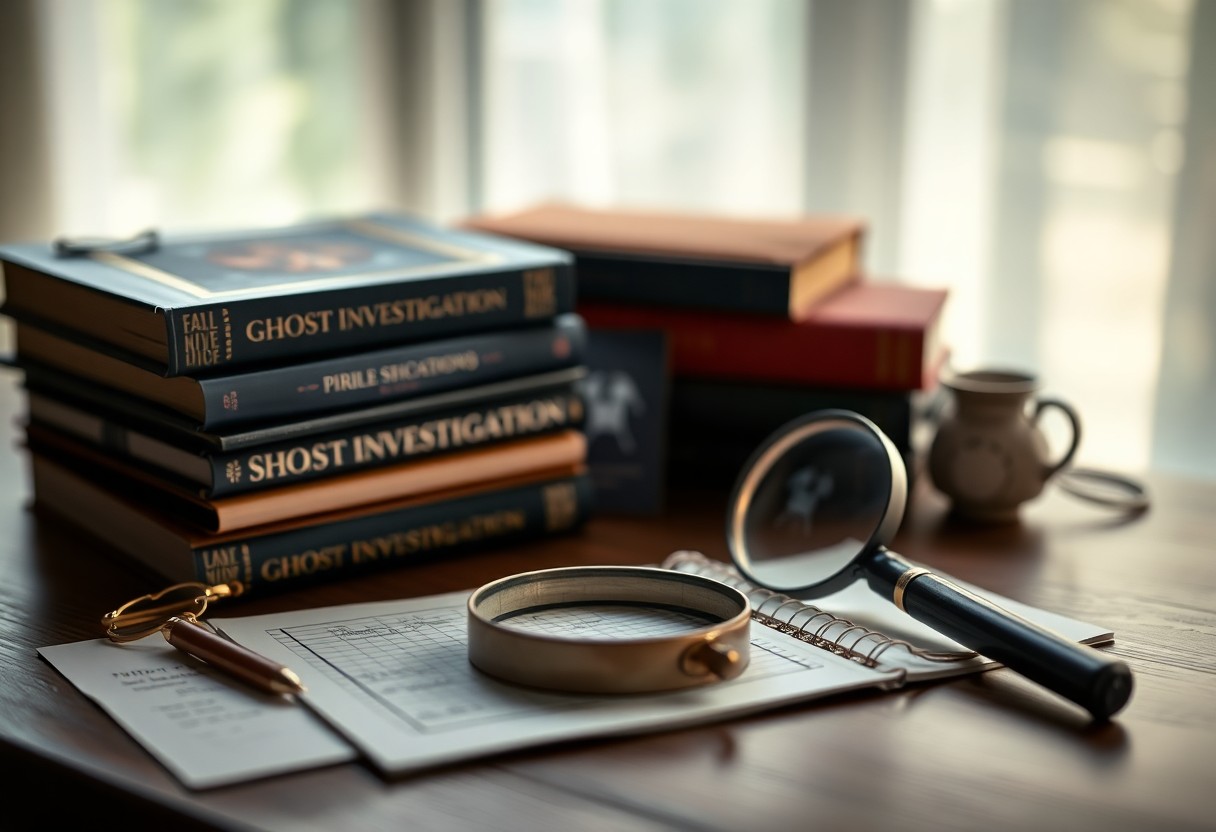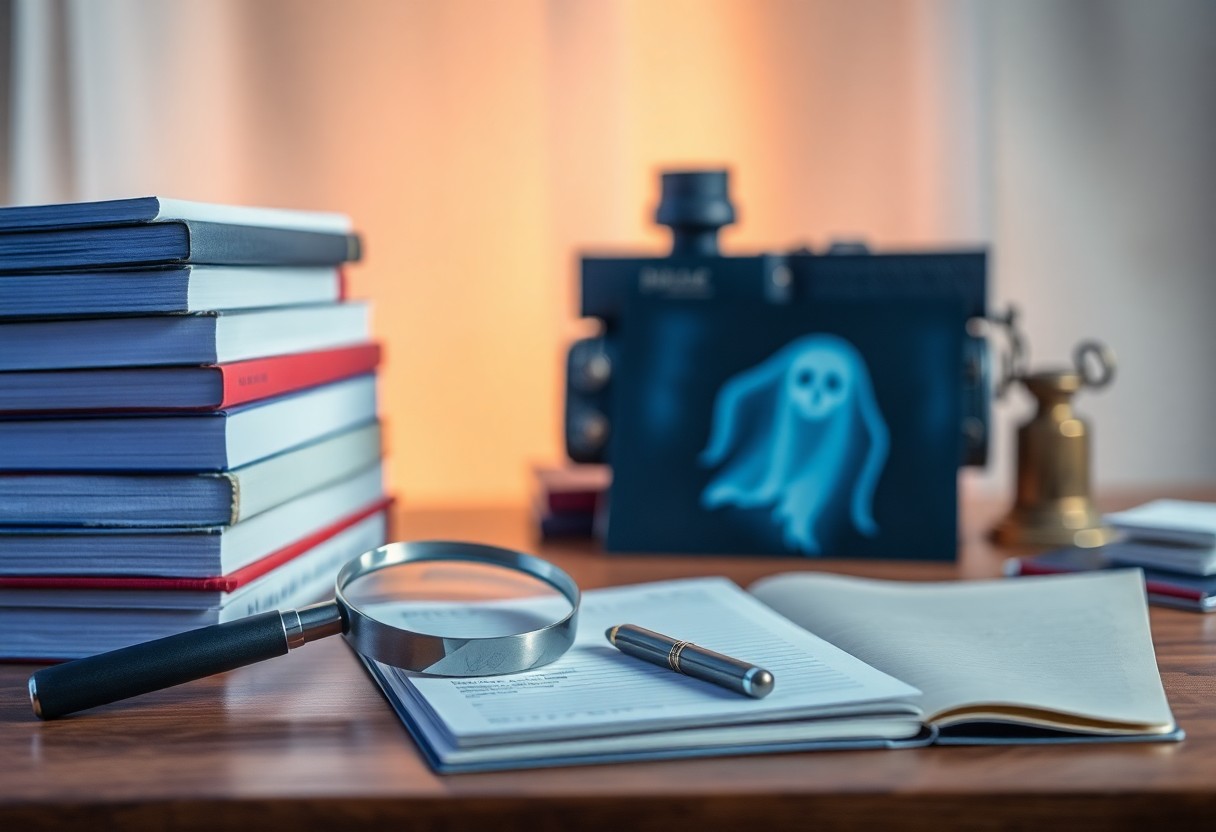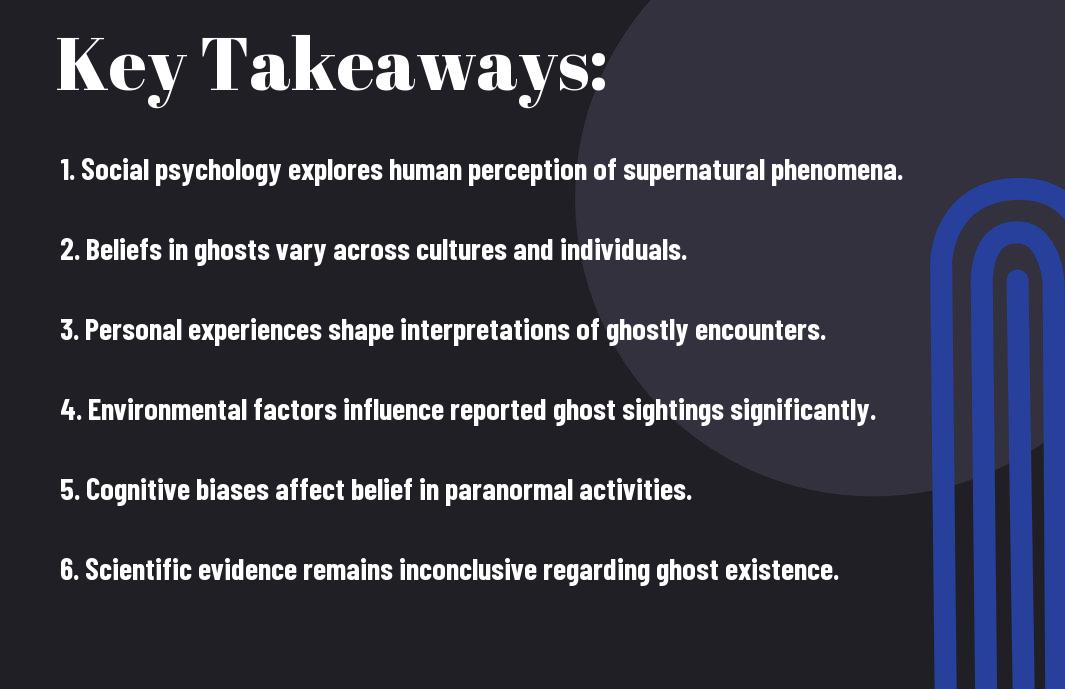Are Ghosts Real? Examining the Evidence with a Social Psychologist
Quote from Alienworldview@protonmail.com on October 8, 2024, 4:05 pmThere's a longstanding fascination with the existence of ghosts, often fueled by personal experiences, folklore, and popular media. In this blog post, you will research into the findings of social psychology to uncover the evidence surrounding this enigmatic topic. By exploring common misconceptions and psychological explanations, you can gain a clearer understanding of how your beliefs about ghosts may be shaped by your environment and mindset. Join us as we investigate the age-old question: Are ghosts real, or are they simply products of our imagination?
Understanding Ghosts: Cultural Perspectives
The idea of ghosts transcends geographical boundaries, deeply rooted in the cultural histories and spiritual beliefs of societies around the world. Each culture brings its own interpretation of what ghosts represent—some view them as malevolent spirits, while others see them as benevolent guides. Understanding these cultural perspectives can provide you with a more nuanced view of why ghosts have fascinated humanity for centuries.
Historical Beliefs in the Supernatural
For many civilizations, the belief in supernatural entities has shaped their understanding of life and death. Ancient Egyptians revered the spirit world, constructing elaborate tombs to ensure their deceased could transition peacefully. In contrast, medieval Europe was rife with tales of hauntings that dictated community fears and behaviors, showcasing how historical context profoundly influences your perception of the supernatural.
Variations Across Cultures
Ghosts manifest differently across various cultures, reflecting local beliefs and societal norms.
With unique interpretations in East Asian cultures, for instance, the concept of "hungry ghosts" emphasizes the importance of ancestor veneration and highlights the consequences of neglecting one's family lineage. Meanwhile, in Western cultures, ghosts often embody unresolved issues or trauma, frequently depicted in literature and film as tragic figures seeking closure. This rich tapestry of interpretations not only diversifies your understanding of ghosts but also illustrates how deeply intertwined these beliefs are with cultural identity and collective consciousness.
Psychological Explanations for Ghostly Encounters
There's a fascinating interplay between psychology and the experiences people label as ghostly encounters. The way your mind processes stimuli can often lead to perceiving apparitions or other supernatural phenomena. By understanding the psychological factors at play, you may find that some experiences can be attributed to the natural workings of the human brain, rather than the paranormal.
The Role of the Mind in Perception
Before exploring ghostly encounters, consider how your mind actively constructs reality. Your perceptions are influenced by various factors, such as your beliefs, emotions, and past experiences. This means that in a heightened emotional state or unfamiliar environment, your brain may interpret ambiguous sensory information as a ghostly presence, showcasing the powerful connection between perception and psychological states.
Common Psychological Triggers
Across various cultures, certain psychological triggers consistently lead people to experience ghostly encounters. Factors like sleep deprivation, stress, or even environmental stimuli can heighten your suggestibility and vulnerability to perceiving the supernatural. These triggers can create a ripe atmosphere for misinterpretation of ordinary phenomena, making your mind more likely to attribute them to ghosts.
Even subtle influences, such as changes in temperature or low lighting, can affect your perception and interpretation of experiences. When you're in a state of anxiety or fear, your brain is wired to look for threats, which can manifest as sensations or sightings of ghostly figures. Understanding these common psychological triggers can help you discern between genuine encounters and those rooted in your mind's complex workings.
Investigating Paranormal Claims
While many people share their eerie encounters with ghosts, it is crucial to examine these experiences through scientific scrutiny. Social psychologists approach paranormal claims by evaluating evidence and exploring psychological factors that may contribute to these beliefs. By shedding light on the intricacies of human perception and experience, you can better understand the claims surrounding ghostly phenomena and whether they hold any substantial validity.
Methodologies in Ghost Research
Research on paranormal activity employs various methodologies. These may include in-depth interviews, surveys, and controlled experiments to capture individual experiences and explore the social context influencing these beliefs. Techniques like observational studies and the use of technology, such as EMF meters, are vital for gathering data that can either support or challenge paranormal claims.
Review of Notable Case Studies
To gain further insight into ghost phenomena, examining notable case studies can provide a clearer picture. You may find these examples compelling, as they reveal both the nature of human experiences and the resulting findings:
- The Enfield Poltergeist (1977): Over 30 witnesses reported disturbances, including levitation and communication with spirits.
- Ghost of Anna Lisa (2003): Audio recordings captured unexplained voices during investigations, with a focus on environmental changes.
- Stanley Hotel (2006): Guests and staff reported 200+ unexplained incidents over several decades, leading to formal investigations.
- Brown Lady of Raynham Hall (1936): Famous photograph taken by a news team sparked ongoing debate about authenticity, analyzed through expert scrutiny.
Even a brief examination of these case studies reveals that each has had a significant impact on the belief in ghosts. Your understanding of these documented encounters can shape your perspective, as they offer both anecdotal and tangible evidence surrounding paranormal activity. Through these examples, you gain insight into the interactions between psychological factors and reported experiences, prompting reflections on the nature of reality itself.
The Influence of Media and Technology
For many individuals, the portrayal of ghosts and the supernatural in media and technology can significantly impact your beliefs and perceptions. From sensationalized documentaries to gripping supernatural films, these forms of entertainment often shape your understanding of the paranormal, guiding you toward either skepticism or belief. The narratives presented can evoke strong emotions and influence your cognitive biases, often blurring the lines between reality and fiction.
Documentaries and Television Impact
To examine the impact of documentaries and television shows, consider how they frame the study of ghosts. Programs often present anecdotal evidence and dramatizations that captivate your attention, making paranormal experiences seem more plausible. As a result, you may find yourself more inclined to accept these representations as fact, reinforcing existing beliefs or even instilling new ones.
Social Media's Role in Shaping Beliefs
Any discussion on belief in ghosts today must address social media's powerful influence. Platforms like Facebook, Twitter, and Instagram serve as arenas where individuals share personal encounters, videos, and articles related to the paranormal, effectively creating communities that validate your beliefs or experiences. These platforms amplify your exposure to similar narratives, fostering a sense of connectivity among believers and skeptics alike, and often leading to the normalization of ghostly phenomena.
A significant aspect of social media is its ability to curate content that resonates with you, often based on your engagement patterns. As you interact with posts about ghosts, algorithms feed you more of the same, creating a feedback loop that can intensify your beliefs. The ease of sharing experiences and collective validation found in online communities can shape your perception of what is real, prompting you to consider the experiences of others as credible evidence of the supernatural. Additionally, the pervasive presence of ghost-themed content may desensitize you to skepticism, making it easier to accept paranormal claims without critical inquiry.
Scientific Approaches to the Paranormal
Now, as you explore the topic of whether ghosts are real, it's important to explore the scientific methods applied to paranormal investigations. Researchers often use technology, such as electromagnetic field meters and thermal imaging, to gather data. This approach provides a framework for analyzing claims of ghostly encounters. For a deeper understanding, check out Are ghosts real? A social psychologist examines the evidence.
The Intersection of Psychology and Science
Across disciplines, psychology plays a vital role in understanding how human perception influences experiences with the paranormal. You may find it fascinating that psychological factors, such as suggestibility and cognitive biases, shape your interpretation of unexplained phenomena.
Current Research Trends
The field of paranormal research is evolving, as scientists explore the psychological aspects that contribute to reported ghost sightings. Researchers are increasingly focusing on the neurobiological and social factors that lead individuals to perceive the paranormal in their environments.
Due to advancements in technology and a growing interest in mental health, these research trends are gaining traction. Studies frequently examine phenomena like sleep paralysis and sensory deprivation, revealing how the brain may trick you into believing in supernatural occurrences. This blending of psychological insights with scientific rigor is helping to unravel the mysteries behind why people believe in ghosts.
Personal Accounts and Anecdotal Evidence
Despite the lack of scientific proof, many individuals report personal experiences that they believe are related to ghosts. These stories often capture the imagination and provoke thought about the unexplained. To explore this further, you can read about various encounters and hear perspectives by visiting Are ghosts real? A social psychologist... - WOWK 13 NEWS.
Survivor Narratives and Testimonies
Narratives of those who have experienced supernatural encounters are often shared in intimate settings, allowing for a deeper understanding of their emotions and beliefs. These testimonies can be powerful, evoking empathetic responses as you consider the profound impact that such experiences may have on individuals' lives.
The Importance of Context and Interpretation
Accounts of ghostly encounters can significantly vary based on the context in which they are experienced. You may find that personal beliefs, cultural backgrounds, and environmental factors all play roles in shaping how an experience is interpreted. This highlights the subjective nature of anecdotal evidence, as the same occurrence can be perceived dramatically differently by various individuals.
Also, when evaluating these accounts, it's crucial to consider the broader context. Many narratives emerge from individuals who may be experiencing emotional distress or significant life changes. You might find that these factors influence not only the perception of an experience but also its significance, ultimately shaping the belief in the existence of ghosts. By understanding the contexts in which these stories develop, you can better appreciate the complexity behind personal testimonies and their implications for belief in the supernatural.
Conclusion
Summing up, you've explored various perspectives on the existence of ghosts through the lens of social psychology. By examining the psychological factors that influence beliefs in the supernatural, you can better understand why many people report experiences that are interpreted as ghostly encounters. The evidence remains largely anecdotal, shaped by individual perception and cultural context. Ultimately, the question of whether ghosts are real may depend more on your beliefs and experiences than on empirical data.
There's a longstanding fascination with the existence of ghosts, often fueled by personal experiences, folklore, and popular media. In this blog post, you will research into the findings of social psychology to uncover the evidence surrounding this enigmatic topic. By exploring common misconceptions and psychological explanations, you can gain a clearer understanding of how your beliefs about ghosts may be shaped by your environment and mindset. Join us as we investigate the age-old question: Are ghosts real, or are they simply products of our imagination?
Understanding Ghosts: Cultural Perspectives
The idea of ghosts transcends geographical boundaries, deeply rooted in the cultural histories and spiritual beliefs of societies around the world. Each culture brings its own interpretation of what ghosts represent—some view them as malevolent spirits, while others see them as benevolent guides. Understanding these cultural perspectives can provide you with a more nuanced view of why ghosts have fascinated humanity for centuries.
Historical Beliefs in the Supernatural
For many civilizations, the belief in supernatural entities has shaped their understanding of life and death. Ancient Egyptians revered the spirit world, constructing elaborate tombs to ensure their deceased could transition peacefully. In contrast, medieval Europe was rife with tales of hauntings that dictated community fears and behaviors, showcasing how historical context profoundly influences your perception of the supernatural.
Variations Across Cultures
Ghosts manifest differently across various cultures, reflecting local beliefs and societal norms.
With unique interpretations in East Asian cultures, for instance, the concept of "hungry ghosts" emphasizes the importance of ancestor veneration and highlights the consequences of neglecting one's family lineage. Meanwhile, in Western cultures, ghosts often embody unresolved issues or trauma, frequently depicted in literature and film as tragic figures seeking closure. This rich tapestry of interpretations not only diversifies your understanding of ghosts but also illustrates how deeply intertwined these beliefs are with cultural identity and collective consciousness.

Psychological Explanations for Ghostly Encounters
There's a fascinating interplay between psychology and the experiences people label as ghostly encounters. The way your mind processes stimuli can often lead to perceiving apparitions or other supernatural phenomena. By understanding the psychological factors at play, you may find that some experiences can be attributed to the natural workings of the human brain, rather than the paranormal.
The Role of the Mind in Perception
Before exploring ghostly encounters, consider how your mind actively constructs reality. Your perceptions are influenced by various factors, such as your beliefs, emotions, and past experiences. This means that in a heightened emotional state or unfamiliar environment, your brain may interpret ambiguous sensory information as a ghostly presence, showcasing the powerful connection between perception and psychological states.
Common Psychological Triggers
Across various cultures, certain psychological triggers consistently lead people to experience ghostly encounters. Factors like sleep deprivation, stress, or even environmental stimuli can heighten your suggestibility and vulnerability to perceiving the supernatural. These triggers can create a ripe atmosphere for misinterpretation of ordinary phenomena, making your mind more likely to attribute them to ghosts.
Even subtle influences, such as changes in temperature or low lighting, can affect your perception and interpretation of experiences. When you're in a state of anxiety or fear, your brain is wired to look for threats, which can manifest as sensations or sightings of ghostly figures. Understanding these common psychological triggers can help you discern between genuine encounters and those rooted in your mind's complex workings.
Investigating Paranormal Claims
While many people share their eerie encounters with ghosts, it is crucial to examine these experiences through scientific scrutiny. Social psychologists approach paranormal claims by evaluating evidence and exploring psychological factors that may contribute to these beliefs. By shedding light on the intricacies of human perception and experience, you can better understand the claims surrounding ghostly phenomena and whether they hold any substantial validity.
Methodologies in Ghost Research
Research on paranormal activity employs various methodologies. These may include in-depth interviews, surveys, and controlled experiments to capture individual experiences and explore the social context influencing these beliefs. Techniques like observational studies and the use of technology, such as EMF meters, are vital for gathering data that can either support or challenge paranormal claims.
Review of Notable Case Studies
To gain further insight into ghost phenomena, examining notable case studies can provide a clearer picture. You may find these examples compelling, as they reveal both the nature of human experiences and the resulting findings:
- The Enfield Poltergeist (1977): Over 30 witnesses reported disturbances, including levitation and communication with spirits.
- Ghost of Anna Lisa (2003): Audio recordings captured unexplained voices during investigations, with a focus on environmental changes.
- Stanley Hotel (2006): Guests and staff reported 200+ unexplained incidents over several decades, leading to formal investigations.
- Brown Lady of Raynham Hall (1936): Famous photograph taken by a news team sparked ongoing debate about authenticity, analyzed through expert scrutiny.
Even a brief examination of these case studies reveals that each has had a significant impact on the belief in ghosts. Your understanding of these documented encounters can shape your perspective, as they offer both anecdotal and tangible evidence surrounding paranormal activity. Through these examples, you gain insight into the interactions between psychological factors and reported experiences, prompting reflections on the nature of reality itself.
The Influence of Media and Technology
For many individuals, the portrayal of ghosts and the supernatural in media and technology can significantly impact your beliefs and perceptions. From sensationalized documentaries to gripping supernatural films, these forms of entertainment often shape your understanding of the paranormal, guiding you toward either skepticism or belief. The narratives presented can evoke strong emotions and influence your cognitive biases, often blurring the lines between reality and fiction.
Documentaries and Television Impact
To examine the impact of documentaries and television shows, consider how they frame the study of ghosts. Programs often present anecdotal evidence and dramatizations that captivate your attention, making paranormal experiences seem more plausible. As a result, you may find yourself more inclined to accept these representations as fact, reinforcing existing beliefs or even instilling new ones.
Social Media's Role in Shaping Beliefs
Any discussion on belief in ghosts today must address social media's powerful influence. Platforms like Facebook, Twitter, and Instagram serve as arenas where individuals share personal encounters, videos, and articles related to the paranormal, effectively creating communities that validate your beliefs or experiences. These platforms amplify your exposure to similar narratives, fostering a sense of connectivity among believers and skeptics alike, and often leading to the normalization of ghostly phenomena.
A significant aspect of social media is its ability to curate content that resonates with you, often based on your engagement patterns. As you interact with posts about ghosts, algorithms feed you more of the same, creating a feedback loop that can intensify your beliefs. The ease of sharing experiences and collective validation found in online communities can shape your perception of what is real, prompting you to consider the experiences of others as credible evidence of the supernatural. Additionally, the pervasive presence of ghost-themed content may desensitize you to skepticism, making it easier to accept paranormal claims without critical inquiry.
Scientific Approaches to the Paranormal
Now, as you explore the topic of whether ghosts are real, it's important to explore the scientific methods applied to paranormal investigations. Researchers often use technology, such as electromagnetic field meters and thermal imaging, to gather data. This approach provides a framework for analyzing claims of ghostly encounters. For a deeper understanding, check out Are ghosts real? A social psychologist examines the evidence.
The Intersection of Psychology and Science
Across disciplines, psychology plays a vital role in understanding how human perception influences experiences with the paranormal. You may find it fascinating that psychological factors, such as suggestibility and cognitive biases, shape your interpretation of unexplained phenomena.
Current Research Trends
The field of paranormal research is evolving, as scientists explore the psychological aspects that contribute to reported ghost sightings. Researchers are increasingly focusing on the neurobiological and social factors that lead individuals to perceive the paranormal in their environments.
Due to advancements in technology and a growing interest in mental health, these research trends are gaining traction. Studies frequently examine phenomena like sleep paralysis and sensory deprivation, revealing how the brain may trick you into believing in supernatural occurrences. This blending of psychological insights with scientific rigor is helping to unravel the mysteries behind why people believe in ghosts.

Personal Accounts and Anecdotal Evidence
Despite the lack of scientific proof, many individuals report personal experiences that they believe are related to ghosts. These stories often capture the imagination and provoke thought about the unexplained. To explore this further, you can read about various encounters and hear perspectives by visiting Are ghosts real? A social psychologist... - WOWK 13 NEWS.
Survivor Narratives and Testimonies
Narratives of those who have experienced supernatural encounters are often shared in intimate settings, allowing for a deeper understanding of their emotions and beliefs. These testimonies can be powerful, evoking empathetic responses as you consider the profound impact that such experiences may have on individuals' lives.
The Importance of Context and Interpretation
Accounts of ghostly encounters can significantly vary based on the context in which they are experienced. You may find that personal beliefs, cultural backgrounds, and environmental factors all play roles in shaping how an experience is interpreted. This highlights the subjective nature of anecdotal evidence, as the same occurrence can be perceived dramatically differently by various individuals.
Also, when evaluating these accounts, it's crucial to consider the broader context. Many narratives emerge from individuals who may be experiencing emotional distress or significant life changes. You might find that these factors influence not only the perception of an experience but also its significance, ultimately shaping the belief in the existence of ghosts. By understanding the contexts in which these stories develop, you can better appreciate the complexity behind personal testimonies and their implications for belief in the supernatural.

Conclusion
Summing up, you've explored various perspectives on the existence of ghosts through the lens of social psychology. By examining the psychological factors that influence beliefs in the supernatural, you can better understand why many people report experiences that are interpreted as ghostly encounters. The evidence remains largely anecdotal, shaped by individual perception and cultural context. Ultimately, the question of whether ghosts are real may depend more on your beliefs and experiences than on empirical data.
